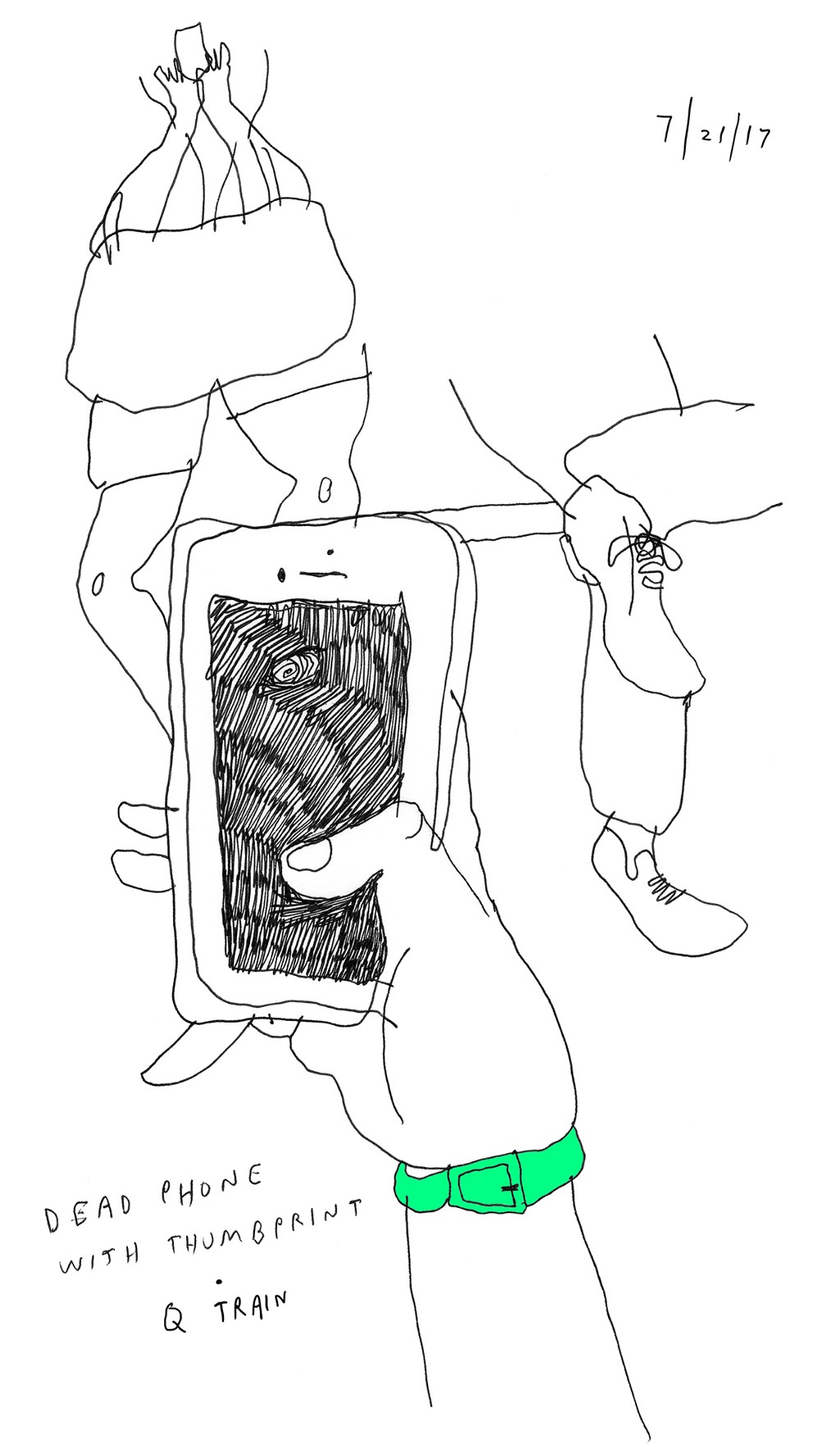A Selection Of Anglospherical Tabloid Euphemisms, Ranked
A listicle without commentary

13. Gross terminological inexactitude
12. Ugandan discussions
11. His door was always open.
10. Colorful racing personality
9. Tireless raconteur
8. Bon viveur
7. Outgoing
6. In high spirits
5. Extremely gregarious
4. Convivial
3. Tired and Emotional
2. Uncompromisingly direct ladies’ man
1. Burnish his own reputation
On The Blocking Of Cock Talk
The linguists, the swears, and who gets to say what where
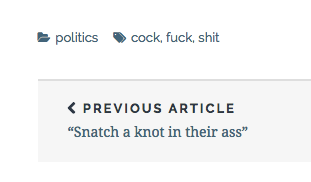
Then there was Scaramucci’s suggestion that Bannon is “trying to suck [his] own cock” — apparently meaning that Bannon is egotistically putting his own interests ahead of the president’s. It’s one thing to call someone a cocksucker, quite another to accuse someone of committing autofellatio. I can’t say I’ve ever heard of this form of self-pleasure being equated with elevating oneself to the detriment of others, but that’s apparently how it works in Mooch-speak.
My favorite language blog of late is “Strong Language,” the one dedicated to bad words. I don’t know about you but I’m loving all these discussions about profanity, not because of the frisson of using dirty words freely in the wider media, but because of the absurd mundanity of parsing out the euphemisms and whether “blow job” is two words or one (TWO), and how in the world autofellatio could be reputation-burnishing. It is also fun to see how FCC rules are applied to allow this word but not that word (MSNBC printed “fucking” in a chyron but would not say it aloud). But how about that comma splice in The New Yorker’s now-famous Twitter card?
Mooch mouth: Scaramucci takes public profanity to a new level
kodomo, "Numbers" (Kodacrome Remix)
That thing a million miles a way is the finish line.
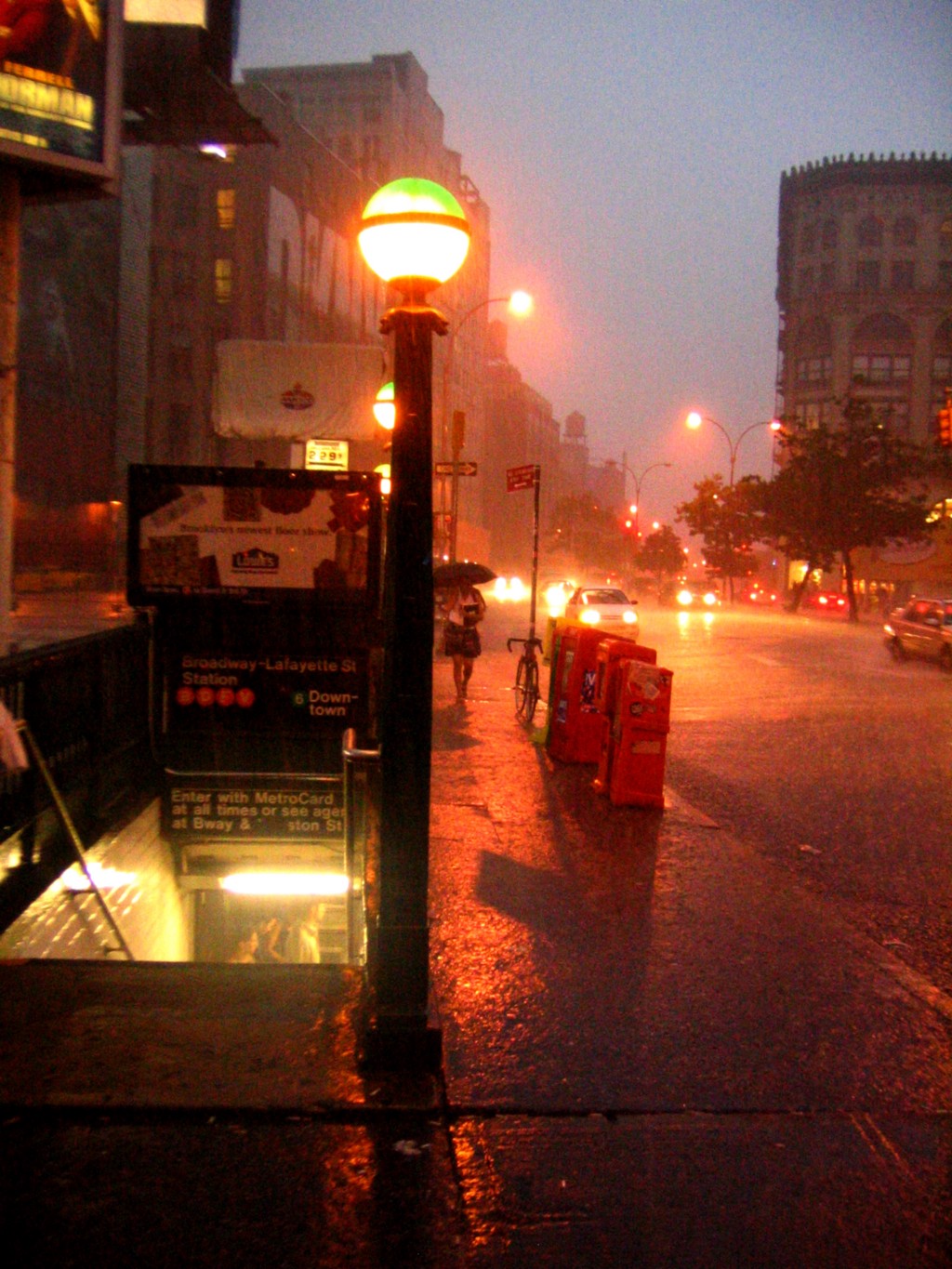
I’m sure a thousand things will happen before the week finally ends but ten thousand things have already come to pass in the previous four days so at this point you might not even notice them. Anyway, we’re almost there. Courage! Also, enjoy.
New York City, July 26, 2017

★★★★★ The breeze had wended its way even down the stairway leading toward the batting cages in the old bank basement. Voices in the morning throng by the subway entrance marveled aloud at how nice it was. “I’m liftin’ weights, I’m lookin’ outside,” a man said. The light was sharp and attentive; reflections in the windows were more solid than whatever was in the interiors. The breeze stayed cool even as the sun got warmer. The shades on the upper floors of the Empire State Building, lowered or half-lowered, made irregular patterns of light blue almost identical to the color of the sky behind. Fabrics were unwilted at evening rush hour. The sinking sun hit a band of cloud and flared out above and below it. The crust of the pie from the grocery store was light and crispy, untouched by humidity.
Baking Focaccia With Vivaldi
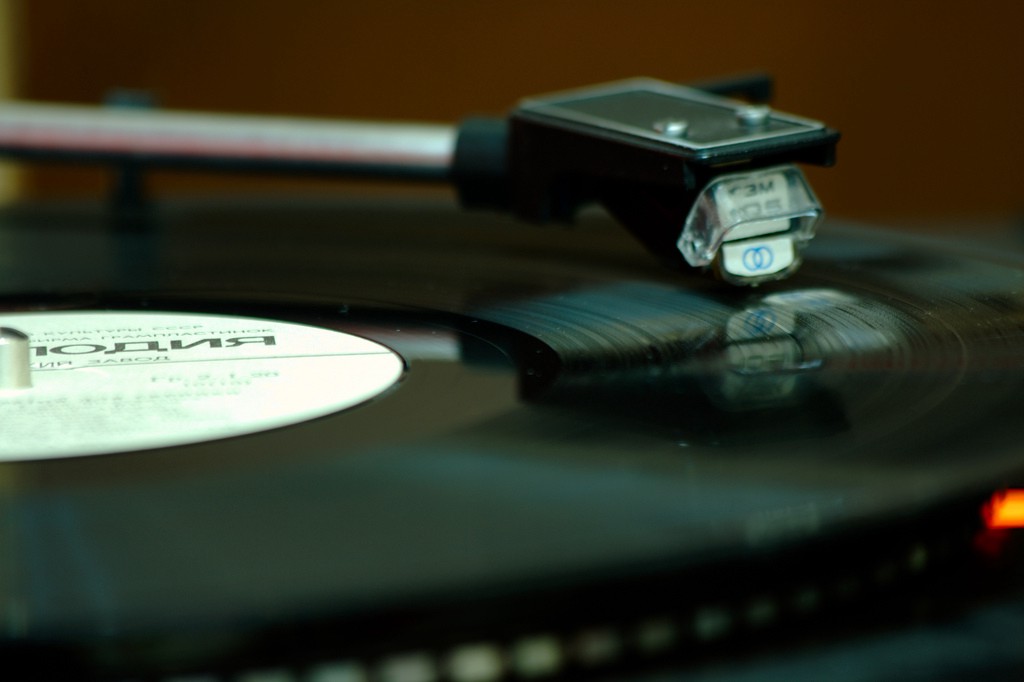
I realized with horror midway through kneading my very first focaccia this past weekend that I had yet to cover an Italian composer for this column. (The focaccia, for what it’s worth, turned out fine.) The reason for this is twofold. First, it’s essential to know that much of my favorite Italian classical music is, in fact, opera, and while I love listening to it, I’ve yet to approach it in an academic or historical context. It wouldn’t be right for me to write on it — not yet, that is. And at least I know it’s more than just vowels. The other reason is that this column is young, and there are a lot of folks I haven’t written about, and also can you believe I hadn’t made focaccia before? The world is big.
So let’s talk about Antonio Vivaldi who is, given his birth year of 1678, not at all a classical composer but in fact a Baroque composer. Baroque! New territory! This is good and exciting for you and for me. Baroque was the form of music that came before Classical but after Renaissance. Among other contributions to numerous to count here, baroque music invented an emphasis on key — i.e., playing music in one consistently and exploring it melodically — as well as gave rise to forms like the concerto in which one instrument takes the solo lead in a three movement piece of music.
One of those examples is this week’s selection, and that’s Vivaldi’s Concerto in C Major for Mandolin, Strings, and Continuo (recorded in 2010 by L’Arte dell ‘Arco). First of all, [record scratch], mandolin? Hell yes. This proto-guitar, cousin of the lute, plays a key role in a lot of Baroque music, and to a modern listener, gives it an otherworldly charm. And of all the instruments to feature in a concerto, this one felt the most different in the context of this column as a whole. There’s a new skill on display here in the almost impossible speed at which the strings are plucked. In addition, you might find yourself, in reading the name of this piece, be asking, “what to heck is ‘continuo’ supposed to mean?” Well, dummies, continuo was shorthand for continuo basso which is the harmony line in a baroque concerto. So it could consist of any number of instruments. You’ll notice that there’s some fun harpsichord in the harmony; if you don’t know what a harpsichord is, it’s the instrument that sounds kind of like, “what if piano but weird?”
There’s an easy listenability to a Vivaldi piece. Its opening Allegro movement is a buoyant piece of music. It’s repetitive, of course, because this is relatively early in terms of musical development, and this type of simplicity allows you to learn the melody as its playing out in front of you. Keep in mind that this was written during a time when music was yet to fully reflect on big capital-T Themes. This is not about Fate or Love or Loss: it’s about being in C Major and having a nice time just hanging out there. You won’t stumble across any surprises, but that’s what makes it strong and good.
The Largo is a more muted step forward. Here’s where the sparseness of the instrumentation really shows. I’ve yet to cover a piece that feels so stripped down, so plain-faced about what it is and trying to be. There’s value in the space here — in the rests, in the silence between notes. I love the uncertainty of it. It’s not sad or tragic in tone, it’s something slightly more haunting and unknowable.
But like any concerto, its final Allegro is rollicking and cheerful, like a dance. An old dance. For all its listenability, Vivaldi does feel dated in an interesting way. You know you’re listening to something older, a piece of art that existed to be groundwork for art more often valued above it. But credit where credit is due! You would not have the melodic complexity of Mozart nor the playfulness of Saint-Säens nor the lightness in the dances of Strauss without these little concertos first.
While this is the only Vivaldi piece I’m discussing this week, he’s a composer whose work you could listen to for hours on end. As I spent my afternoon baking, I left the Vivaldi album page up and just let the albums play through. The concertos are so much fun, and so short and so lovely they might as well be modern earworms.
Fran Hoepfner is a writer from Chicago. You can find a corresponding playlist for all of the pieces discussed in this column here.
What Lamar Odom Did
The retired basketball player tells his story of drugs and darkness
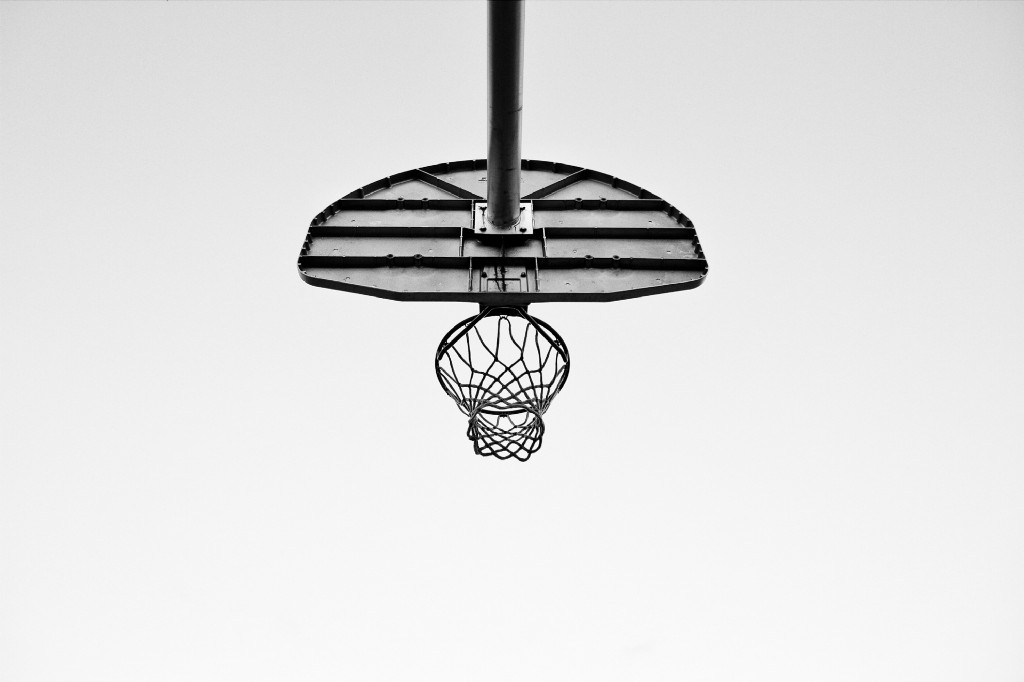
I’m a millionaire. I’d made it out of Jamaica, Queens, and won two NBA titles. And I’m in a motel, with some random person, doing coke. But I just wanted to get high with this girl, and I had no other place to go. I couldn’t take her home. You know, I was being a scumbag. Nothing else I got for that. No excuses. No bullshit. That’s just the truth.
My dick and my habit took me down all the roads that you don’t ever wanna go down. A lot of great men are fools to that. Fools to that. There are probably a lot of young dudes out there who hear my story and think that it could never happen to them. That they’re untouchable.
Done in the Dark | By Lamar Odom
Not one thing about addiction stories is new. Not even the details, really. They are all the same. The only thing that changes is the people telling them and what they have to offer. Say what you will about The Players’ Tribune, but good stuff is good stuff no matter where you get it. And Lamar Odom in his own words is as good as it gets. Read the whole thing here.
Charm? Offensive!

The Sean Spicer rise-and-fall narrative never interested me; the herald is dead, long live the herald. “We’ll Miss You, Sean Spicer,” read the headline atop a Sunday Times op-ed, with all the sincerity Charlie Brown’s pride would display if Lucy resigned from holding the football for the punt. After ticking through a rogue’s gallery of potential replacements, the piece concluded “none of them could possibly convey the combination of chutzpah and shame” projected by Spicer.
“Saturday Night Live” divined months ago that Spicer’s days were numbered, and that Sarah Huckabee Sanders waited gleefully in the wings. Well, as gleefully as she is able: The op-ed also opined Sanders “has all the sparkle and charm of the airline call center employee who tells you there’s no way you can get on a flight to Chicago until at least Wednesday.” Spicer gets “chutzpah and shame,” Sanders gets “sparkle and charm,” spritzed ironically. Like Trump’s Presidential Advisory Commission on Election Integrity, I’d demand to see the receipts. At the very least Sanders deserves a more accurate alloy. Flint and antipathy, maybe.
I admit I’m something of a Sanders apologist. Not for her politics — more as a corrective against the suggestion she should come off as a helpful airline employee. Dee Dee Myers was no Braniff Airways holdover, dispensing coffee in Pucci pink. The line on Sanders, of course, is that she is her father’s daughter. “For those of you who don’t know me yet, my father is Mike Huckabee,” Aidy Bryant grunted, Sling Blade-style, while debuting her Sanders impersonation on “SNL.” She added, almost as an afterthought, “and my mother is a big Southern hamburger.”

Setting aside the fact that a “big hamburger” is no more Southern than a big chicken schnitzel, I will even be generous and suggest that whoever wrote that line did not have in mind Sanders’s actual mother. But I do. Not as a righteous abstraction, but as the real Janet Huckabee, former first lady of Arkansas.
I covered state government there occasionally, and have spent time observing and writing about Mike Huckabee, including a surreal Saturday afternoon in 2010 hanging around the greenroom of “Huckabee,” the former governor and occasional presidential candidate’s erstwhile Fox News talk show. I was there to try and suss out whether Huckabee planned a second run at the Republican nomination, for Arkansas Life magazine, a supplement of The Arkansas Democrat-Gazette. The show’s host was not long past officiating his daughter’s wedding to Bryan Sanders, a political operative Huckabee’s campaign had inherited from the failed one of Sam Brownback. Guests for that day’s taping included a love child of Fidel Castro’s, along with Newt and Callista Gingrich (who does seem like a Braniff Airways holdover.)
The patter of the warm-up comedian was of a piece with Huckabee’s Dad jokes: “Did you hear about the fire at the circus? It was in tents.” “SNL” got it backwards about Sarah Huckabee Sanders. She is her mother’s daughter; her father is the big Southern afterthought. Janet Huckabee’s eye roll at that circus-fire joke would have be so strenuous even Sarah would feel it, likely dropping a false eyelash. Mike Huckabee had already experienced the call to ministry by the time he met his future wife, when they were both students at Hope High School. As Slate once noted in an installment of its First Mates series, the future Janet Huckabee would attend Mike’s after-school prayer meetings, “if she didn’t have basketball practice.” Years later, when Sarah Huckabee Sanders was named to Time’s “40 Under 40” list of ascendant politicos, she claimed to have little time for blog-reading, between being a newlywed, and managing her fantasy football team.
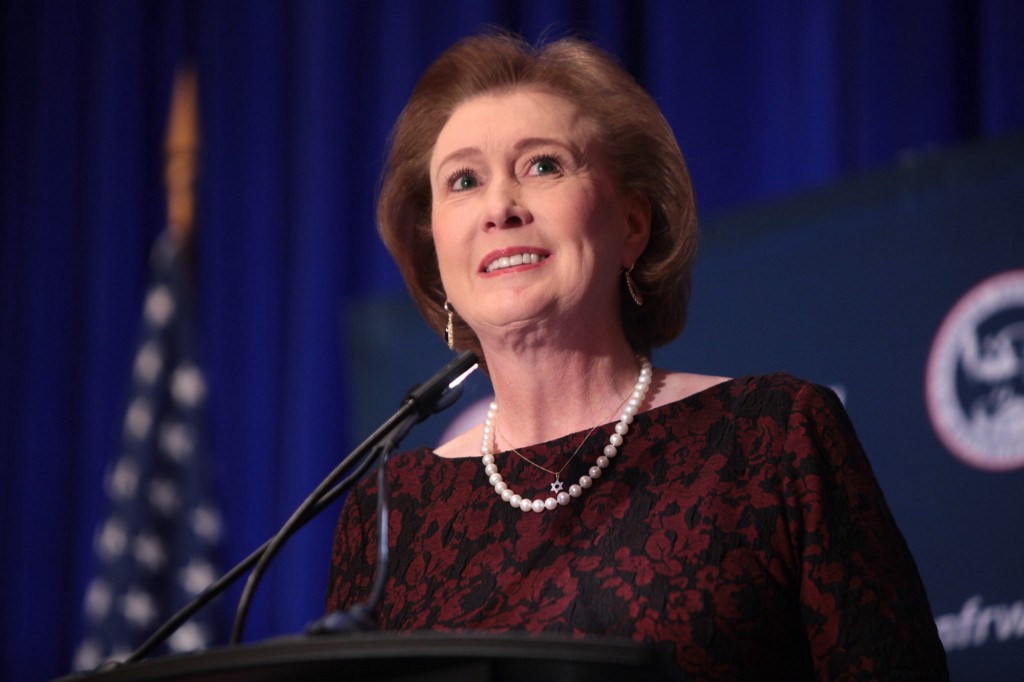
Her mother had not been a first lady who, to borrow a notorious quote from another, “stayed home, baked cookies and had teas.” She drove nails into Habitat for Humanity homes — and not just for photo ops. “I will take non-physical risks, such as running for office,” Mike Huckabee wrote in his book Character Makes a Difference. “Janet will take physical risks — climbing cliffs, parasailing, racing cars or stalking bears.”
When a young middleweight fighter named Jermain Taylor emerged from a makeshift boxing gym in Little Rock to the national spotlight, the Arkansas first lady took up his cause and became an avid fan of the sport. At a blustery press conference before a 2006 professional bout, The New York Daily News documented Janet Huckabee trying to get in the head of Taylor’s opponent. “Kassim, you’re a dead duck,” she taunted, addressing the boxer Kassim Ouma. In his native Uganda, Ouma was kidnapped at the age of six and forced to serve in the National Resistance Army until he was 19. The Daily News described the former child soldier smiling politely at Janet Huckabee’s warning, as one might after a Dad joke.
When most writers were filing their “Sean Spicer, we hardly knew ye” pieces, I was reading a tribute to a woman’s voice at once:
naive, didactic, hard-headed…completely lacking in self-consciousness…and unintentionally hilarious,” one in which “shootings, stabbings, and public hangings are recounted frankly and flatly, and often with rather less warmth than…political and personal opinions upon which [she] digresses.
This was novelist Donna Tartt, writing in an Overlook Press edition afterword about Mattie Ross, the vengeance-seeking heroine and narrator of Charles Portis’ True Grit, just 14 when we meet her. But to my ear it could just as easily have been a Twitter thread following Sarah Huckabee Sanders’s first day on the new job, shooting from the hip in her double-action southwest Arkansas drawl. Some readers have been inclined to see Mattie as a female Huck Finn — that is, a national treasure. But how anchored is that affinity to the preference she remain an eternal tween? “A woman with brains and a frank tongue…is at some disadvantage,” Mattie remarks at the end of the novel, when we understand it’s all been rueful memory, recited sentiment-free by a spinster. “Mattie is a much harder customer than careless, sweet-tempered Huck [Finn],” Tartt decides.
Last spring when Joan Didion published South and West, the reviews promised the book’s data dump of unused notes from a Gulf Coast reporting trip in 1970 would take us slouching toward Baton Rouge, for a sense we’d been present at the birth of the Trump voter. Of America’s white women who voted in 2016’s presidential election, 53 percent of them cast their ballots for Donald Trump; presumably, Janet and Sarah Huckabee were two of them. Didion, growing up in Republican Southern California, had been a self-proclaimed Goldwater girl. Flying to her hometown with Michiko Kakutani she once gazed out the airplane window and mused, “anybody who talks about California hedonism has never spent a Christmas in Sacramento.” Kakutani understood she was talking about understanding conservatism.
Didion also had made an enemy of Nancy Reagan; I figured she might have met and deconstructed some unreconstructed proto-Huckabees, so South and West I went. But Didion seems to have only encountered lovelorn manicurists, ladies who luncheon but have no passports, and those who look askance while she swims in a bikini in the Howard Johnson’s pool. This seems to bear out her own self-criticism, that “all the reporting tricks I had ever known atrophied in the South.”
I’ve read enough of Didion’s self-criticism to know that she never speaks highly of her own reporting tricks, and enough of her fiction to know she does not much gravitate toward women who clearly know their own minds. The only female figure in South and West who does seem to know hers is one of the rare professional women Didion meets, a physician taking time off to renovate her house. I couldn’t help but think of Janet Huckabee pounding nails, or her daughter shooting daggers with her eyes at Jim Acosta.
“In certain ways she seemed to have been affected by the great leap she had taken out of her time and place,” Didion writes. “In order to be her own woman she had found it necessary to vehemently reject many of the things which traditionally give women pleasure, cooking…any vanity about her own appearance, any interest in having her house reflect her own tastes.” In other words, were she an airline call center employee, she’d have been one of those emotionally stunted ones, with no personal investment in whether or not you make it to Chicago.
Were she a White House press secretary she might even ban cameras, or bark non-answers. You can resent Sanders’s caginess because it represents an atrophying of the First Amendment, but I cannot help but admire the frontier self-preservation I see at work there. “I would not put a thief in my mouth to steal my brains,” Mattie says in True Grit, declining alcohol. To Sanders that’s what news cameras represent, a thief in her mouth, creeping up on her brains. You could argue she’s in the wrong line of work, then, but I say we won’t soon be in a position to backhand-compliment her chutzpah and shame as she skulks off to the private sector. I’d bet a big Southern hamburger dinner on it.
Kyle Brazzel lives in Brooklyn but still spends time in Arkansas. His accurate alloy would be sloth and Ro-Tel.
A Poem by Kate Colby
Integer*
1
Wind can’t move the light
only what’s in front of it.
Stirring shadow-
shaped leaves
or dead specimens
in Plexiglas? Dodo
is a word, a museum
of museums.
2
Every time I hear Rocket Man
I’m reminded of you
reminded of me
every time you hear Rocket Man.
3
* A thing complete in itself.
All that I can see from
the distance of the sun
the moon has broken
up with its light.
I was caught, kissed
in the teeth of a time-
worn cemetery —
love isn’t real
only how you feel it.
Kate Colby’s books include I Mean and Fruitlands. The Arrangements is forthcoming in 2018. She has received awards and fellowships from The Poetry Society of America, RI State Council for the Arts and the Woodberry Poetry Room at Harvard. She lives in Providence.

